
GLOBAL ECOLOGY AND BIOGEOGRAPHY
Scope & Guideline
Fostering Knowledge for Conservation and Global Change
Introduction
Aims and Scopes
- Biodiversity and Ecosystem Functioning:
The journal emphasizes research that investigates the relationship between biodiversity and ecosystem functioning, exploring how the diversity of species influences ecosystem services and resilience. - Climate Change Impacts:
A significant focus is placed on understanding the effects of climate change on species distributions, community dynamics, and ecosystem health, often using global datasets to infer trends and predict future scenarios. - Biogeographical Patterns and Processes:
Research published in the journal examines biogeographical patterns of species distributions and the processes that drive these patterns, including historical, ecological, and evolutionary factors. - Functional Ecology:
The journal encourages studies that link functional traits of species with their ecological roles and contributions to ecosystem processes, providing insights into how traits influence community structure and dynamics. - Human Impacts on Biodiversity:
A core area of research includes assessing the impacts of human activities, such as land-use change and invasive species, on biodiversity and ecosystem functions, highlighting the need for conservation strategies. - Meta-Analyses and Synthesis Research:
GLOBAL ECOLOGY AND BIOGEOGRAPHY often publishes meta-analyses and synthesis studies that integrate findings from multiple studies to provide overarching insights into ecological and biogeographical trends.
Trending and Emerging
- Integrative Approaches to Biodiversity Research:
There is a growing trend towards integrative approaches that combine ecological, evolutionary, and biogeographical perspectives, allowing for a more comprehensive understanding of biodiversity and its drivers. - Remote Sensing and Big Data Analytics:
The use of remote sensing technologies and big data analytics is increasingly prominent in studies, enabling researchers to monitor biodiversity and ecological changes at unprecedented scales. - Functional Trait-Based Research:
Emerging research is focusing on functional traits and their role in ecological interactions and community dynamics, providing insights into how species contribute to ecosystem processes. - Climate Change Adaptation Strategies:
There is a rising interest in understanding how species and ecosystems can adapt to the changing climate, including research on resilience and management strategies to mitigate impacts. - Urban Ecology and Biodiversity:
The intersection of urban ecology and biodiversity is gaining attention, as researchers explore how urban environments influence species interactions, distributions, and conservation efforts.
Declining or Waning
- Historical Biogeography Studies:
There has been a noticeable decrease in studies focusing exclusively on historical biogeography, as contemporary research increasingly emphasizes current ecological dynamics and responses to climate change. - Local Scale Studies:
Research that focuses solely on local ecological processes without broader implications for regional or global biodiversity trends is becoming less prominent, as the field moves towards integrating local findings into larger-scale analyses. - Traditional Species Richness Assessments:
The emphasis on merely documenting species richness in specific areas is waning, with a shift towards understanding functional diversity and ecological interactions, reflecting a broader interest in the implications of biodiversity.
Similar Journals
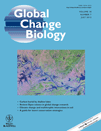
GLOBAL CHANGE BIOLOGY
Navigating the Complexities of Global Environmental ChangeGLOBAL CHANGE BIOLOGY, published by Wiley, is a leading journal dedicated to advancing the scientific understanding of the relationships between biological systems and global environmental changes. With an impressive impact factor placing it in the Q1 category across multiple disciplines—including Ecology, Environmental Chemistry, and Global and Planetary Change—this journal is essential for researchers, professionals, and students aiming to stay at the forefront of this dynamic field. The journal has a rich history since its inception in 1995, continually providing a platform for high-quality research that informs policy and management practices worldwide. Although it is not open access, the journal remains a valuable resource for those committed to exploring the complexities of ecological and environmental change. With a Scopus ranking of #3 in Global and Planetary Change and #6 in both Ecology and Environmental Chemistry, GLOBAL CHANGE BIOLOGY continues to shape the dialogue on the pressing environmental challenges of our time.

ACTA OECOLOGICA-INTERNATIONAL JOURNAL OF ECOLOGY
Fostering Collaboration for a Greener TomorrowACTA OECOLOGICA-INTERNATIONAL JOURNAL OF ECOLOGY, published by Elsevier, stands as a prominent platform for disseminating innovative research in the diverse field of ecology. Operating since 1983 and continuing to make significant contributions into 2024, this journal features critical studies that advance our understanding of ecological systems, behaviors, and conservation efforts. With an impressive Q2 ranking in both the ecology and nature conservation categories, it exemplifies high-quality scholarship, reflected in its Scopus rankings—#74 in Environmental Science and #254 in Agricultural and Biological Sciences. Researchers, professionals, and students in the field are invited to explore the latest findings and methodologies that address pivotal ecological issues. As a journal committed to fostering academic collaboration, ACTA OECOLOGICA is essential for anyone dedicated to enhancing their comprehension of ecological dynamics and advancing sustainability practices globally.

Ecosistemas
Unveiling the dynamics of nature through collaborative study.Ecosistemas is a prominent Open Access journal published by the ASOCIACION ESPANOLA ECOLOGIA TERRESTRE, specializing in the field of ecology. Since its inception in 2001, it has dedicated itself to advancing ecological knowledge and research, fostering an inclusive platform for the dissemination of cutting-edge studies that span ecological interactions, sustainability, and biodiversity. The journal, based in Spain, has established its reputation with notable rankings such as Q3 in the field of Ecology and Q4 in Ecology, Evolution, Behavior, and Systematics, reflecting its commitment to quality research. With a Scopus Ranks position placing it in the 40th and 37th percentiles for its categories, Ecosistemas is integral to the academic community, serving researchers, professionals, and students alike. It provides a vital resource for those seeking to understand ecological dynamics and environmental challenges, facilitating open access to important findings and discussions that shape the future of our ecosystems.
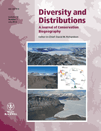
DIVERSITY AND DISTRIBUTIONS
Empowering global discussions on biodiversity and conservation.DIVERSITY AND DISTRIBUTIONS is a leading journal in the field of ecology, evolution, and systematics, published by WILEY. With an impressive impact factor and designated as Q1 in its category for 2023, this journal ranks 49th out of 721 in the Scopus database, placing it in the top 93rd percentile among its peers. The journal has been committed to advancing knowledge since its inception in 1998 and has embraced Open Access since 2019, ensuring that research is accessible to a broad audience globally. By publishing high-quality, peer-reviewed articles that explore biodiversity patterns, conservation strategies, and ecological dynamics, DIVERSITY AND DISTRIBUTIONS plays a crucial role in fostering discussions that help to understand and mitigate global ecological challenges. Located in the United Kingdom, this journal serves a diverse community of researchers, professionals, and students, making significant contributions to science and policy regarding biodiversity and its distributions.

Neotropical Biodiversity
Connecting global minds through Neotropical ecological research.Neotropical Biodiversity is a prominent journal dedicated to advancing our understanding of biodiversity and ecological dynamics within the Neotropical region. Published by TAYLOR & FRANCIS LTD in the United Kingdom, this Open Access journal has been providing unrestricted access to research findings since 2015, fostering collaboration and knowledge sharing among the global scientific community. With an emphasis on innovative research in Ecology, Ecology, Evolution, Behavior and Systematics, and Global and Planetary Change, it has earned a reputation for excellence, currently holding a Q3 category in its field. As of 2023, the journal ranks in the 37th percentile for Environmental Science (Ecology) and in the 36th percentile for Agricultural and Biological Sciences (Ecology, Evolution, Behavior and Systematics), making it a valuable resource for researchers, professionals, and students interested in understanding and preserving biodiversity in one of the world's most diverse ecosystems. We invite you to explore the cutting-edge research published in Neotropical Biodiversity and contribute to the ongoing dialogue for environmental sustainability and ecological resilience.
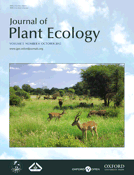
Journal of Plant Ecology
Innovating Understanding in Plant ScienceJournal of Plant Ecology, published by Oxford University Press, is a premier journal dedicated to advancing the scientific understanding of plant ecology. With an ISSN of 1752-9921 and an E-ISSN of 1752-993X, this journal has established itself as a leading resource in the field, maintaining a prestigious Q1 ranking across multiple categories in the 2023 Scopus rankings, including Ecology, Evolution, Behavior and Systematics and Plant Science. The journal's commitment to high-quality research is underscored by its influence in agricultural and biological sciences, reflected in its competitive percentiles. While currently not offering open access, its comprehensive scope spans various ecological issues critical to understanding plant interactions and ecosystems, making it an essential read for researchers, educators, and students alike. The Journal of Plant Ecology not only facilitates the dissemination of vital findings but also fosters collaboration within the global scientific community. Discover more about the latest innovative research and key developments in plant ecology, and contribute to the dialogue that shapes our understanding of environmental stewardship and biodiversity conservation.

ECOSYSTEMS
Connecting research to real-world ecological solutions.ECOSYSTEMS, an esteemed journal published by SPRINGER, stands at the forefront of ecological research with a distinguished Q1 quartile ranking in multiple categories, including Ecology, Evolution, Behavior and Systematics, and Environmental Chemistry for 2023. Founded in 1998, the journal has become crucial for advancing our understanding of ecosystem dynamics and interactions, offering researchers a platform to disseminate significant findings relevant to ecological health and sustainability. Although Open Access is not available, the journal maintains a robust reputation, evidenced by its high Scopus rankings—placing it within the top 10% in diverse ecological domains. With a publication scope that spans fundamental and applied aspects of ecosystems, ECOSYSTEMS serves as an essential resource for professionals and students pursuing innovative ecological solutions, making it indispensable for contributing to the global conversation on environmental sustainability. For more information, please visit the publisher's site or access your institution's library resources.

Folia Oecologica
Pioneering Research in Environmental Sciences.Folia Oecologica is a distinguished open-access journal published by WALTER DE GRUYTER GMBH, focusing on critical research in the fields of agricultural and biological sciences, ecology, and forestry. Established as a vital platform for the dissemination of knowledge, this journal has been providing free access to its valuable content since 2017, catering to an international audience engaged in environmental and ecological studies. With its ISSN 1336-5266 and E-ISSN 1338-7014, Folia Oecologica has earned notable ranks in Scopus, placing it in the 62nd percentile for Agricultural and Biological Sciences and the 50th percentile for Environmental Science. The journal's commitment to high-quality research is reflected in its positions in the Q2 and Q3 quartiles across various categories in 2023. As it converges years from 2006 to 2024, Folia Oecologica continues to foster scholarly dialogue and collaboration among researchers, professionals, and students, making significant contributions to the understanding and preservation of our ecological systems.
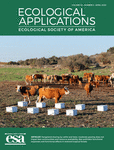
ECOLOGICAL APPLICATIONS
Advancing ecological understanding for a sustainable future.ECOLOGICAL APPLICATIONS, published by WILEY, is a leading journal in the field of ecology, providing a platform for innovative research that addresses the understanding and management of ecological systems. With an ISSN of 1051-0761 and E-ISSN of 1939-5582, it has established itself as a vital resource for ecologists and environmental scientists since its inception in 1991. Ranked in the top quartile (Q1) for Ecology in 2023 and with a Scopus ranking of 40 out of 461 in Environmental Science, ECOLOGICAL APPLICATIONS boasts an impressive impact factor, attesting to its significance and influence in the field. The journal's mission is to publish peer-reviewed articles that contribute to ecological theory and its applications in conservation and environmental management. Researchers, professionals, and students alike will find invaluable insights and the latest developments in ecological research through its comprehensive scope and rigorous scholarship, ensuring a crucial role in shaping future ecological practices and policies.
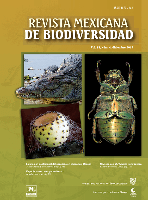
Revista Mexicana de Biodiversidad
Pioneering Research for a Greener TomorrowRevista Mexicana de Biodiversidad is a prominent academic journal dedicated to the field of biodiversity and conservation, published by the prestigious Instituto de Biología, Universidad Nacional Autónoma de México. Since its inception as an Open Access publication in 2005, it has aimed to disseminate high-quality research that advances the understanding of biological diversity in Mexico and beyond. With an ISSN of 1870-3453 and an E-ISSN of 2007-8706, the journal caters to a diverse audience, including researchers, professionals, and students, by providing vital insights into ecological studies, conservation strategies, and the sustainable management of natural resources. The journal is committed to fostering scientific collaboration and promoting the significance of biodiversity in addressing contemporary environmental challenges. By publishing innovative and impactful research, the Revista Mexicana de Biodiversidad plays an essential role in the global discourse on biodiversity conservation.